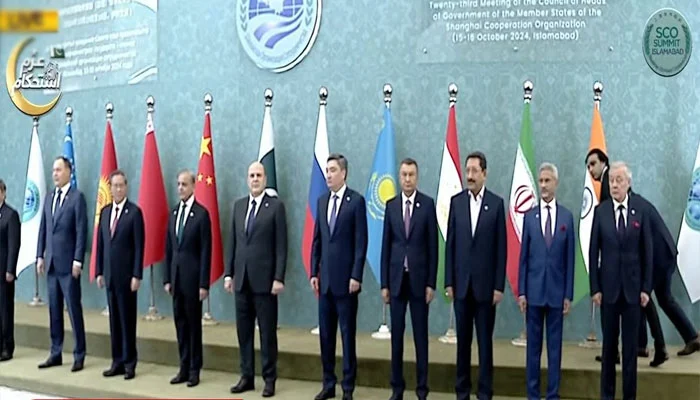ISLAMABAD: SCO Summit marks a pivotal moment as Prime Minister Shehbaz Sharif addressed leaders during the opening ceremony. He emphasized that regional powers face significant transitions, reshaping the global landscape.
The 23rd meeting of the SCO Council of the Heads of Governments is underway at the Jinnah Convention Centre. This summit is the highest-profile event Pakistan has hosted in years. “From the esteemed platform of the Shanghai Cooperation Organisation, a beacon of multilateralism, I believe we have the potential and the will to build a more prosperous and secure future for our people,” PM Shehbaz stated.
Earlier, he welcomed the leaders and posed for a group photo. According to the Foreign Office, discussions will focus on ongoing economic and trade cooperation. Observers suggest that the SCO aims to counter Western influence in the region.
Member states include China, Russia, Pakistan, Kazakhstan, Kyrgyzstan, Tajikistan, Uzbekistan, Belarus, Iran, and India. Sixteen other countries are also observers or dialogue partners. The SCO represents about 40% of the world’s population and around 30% of global GDP. However, its members have differing political systems and some notable disagreements.
Attendees of the SCO Summit include prominent leaders like China’s Premier Li Qiang, Belarus’s Prime Minister Roman Golovchenko, and India’s Foreign Minister Subrahmanyam Jaishankar. Jaishankar’s presence is particularly significant, marking the first visit by an Indian Foreign Minister to Pakistan in nearly a decade. This comes amidst ongoing tensions between the two nuclear powers.
Mongolia and Turkmenistan are also participating, with Mongolia represented by Prime Minister Oyun-Erdene Luvsannamsrai and Turkmenistan by Deputy Chairman Rashid Meredov. Other dignitaries at the summit include SCO Secretary-General Zhang Ming and various business leaders.
Security measures for the SCO Summit are extensive. The city has been largely shut down, with over 9,000 police officers deployed. Roads are blocked, restaurants are closed, and public holidays have been announced to limit movement in Islamabad and Rawalpindi.
During the event, leaders will adopt crucial decisions aimed at enhancing cooperation among SCO member states. They will also approve the organization’s budget. Following speeches from the leaders, PM Shehbaz will conclude the session and oversee the signing of various agreements.
After the summit, Deputy Prime Minister Ishaq Dar and SCO Secretary-General Zhang Ming will address the media to outline the outcomes of the two-day event. PM Shehbaz will also host a luncheon for the attending leaders.
Jaishankar’s visit is particularly noteworthy. He arrived at an airbase near Islamabad, greeted by a lower-level delegation, unlike the other leaders. His arrival was followed by a brief handshake with PM Shehbaz, filled with solemn expressions during the official dinner.
Relations between India and Pakistan have been strained since 2019 when Indian PM Modi revoked the limited autonomy of Kashmir. This move led to a suspension of trade and a downgrade of diplomatic ties. Jaishankar’s visit comes nine years after the last visit by an Indian foreign minister, highlighting the significance of this SCO Summit.
Former Foreign Minister Bilawal Bhutto-Zardari’s rare visit to India last year for an SCO meeting further emphasizes the tension. However, no bilateral meetings are scheduled between the two countries during this summit.
As the SCO Summit unfolds, the eyes of the world remain on Islamabad, where regional leaders are working toward a collaborative future.


